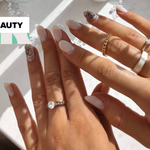The interesting thing about skincare is that there’s never a black and white answer to most questions. A deep dive into almost any topic will always reveal multiple shades of gray. One such topic is alcohol in skincare products.
With its reputation for irritating, stripping, and drying skin, it’s easy to see why alcohol could be considered public enemy number one. But is alcohol really that bad for your skin?
The answer is not necessarily. You see, there are good alcohols and bad alcohols, and the difference between the two can make or break your skincare routine.
What Are The Bad Alcohols And Why?
Just as you might suspect, evaporative alcohols are the ones to avoid when it comes to skincare. Often found on labels as denatured alcohol, ethanol, and isopropyl alcohol, these are the aggressors that can and will strip your skin, leaving it feeling tight and dry.
While they’re often terrible for your skin, skincare manufacturers continue to use them because of how they feel on the skin at the moment of impact, so to speak. Most people seem to think that if a product tingles and slightly burns, that must mean it’s working. A tingling sensation leaves the user with a warm and fuzzy feeling that the product is doing its job.
But while the alcohol may dissolve the oils in your skin, it’s also leaving a trail of destruction behind. Not only is it stripping your skin, but it’s also prompting your skin to compensate (or overcompensate) by producing more oil. So, for those with oily skin, these types of products are just counterproductive.
What Are Good Alcohols In Skincare?
So, while simple alcohols tend to wreak havoc on your skin, we have to be careful not to throw the baby out with the bathwater. Fatty alcohols are also used in skincare products, and those can actually be good for your skin.
Often used as thickeners and emollients, fatty alcohols typically come from coconut or palm oil. These alcohols are the good guys, and they often show up on labels as cetyl alcohol, stearyl alcohol, cetearyl alcohol, and propylene glycol. Good alcohols do not cause irritation, and they can be quite beneficial to dry skin.
The Verdict: Should You Avoid Alcohol In Skincare Products?
So here again, the answer is not black and white. It would be wrong to make a blanket statement and say that all alcohol in skincare products is bad for your skin. That’s simply not true.
While you should steer clear of simple alcohols that will cause irritation and dry skin, you don’t want to miss out on the benefits of fatty alcohols. These types of emollients do the heavy lifting in some skincare products to soften and moisturize your skin.
The most important thing you can do is read the label. Look for the ingredients we mentioned above, leave the products with bad alcohols on the shelf and opt for those with ingredients that are beneficial to your skin.







